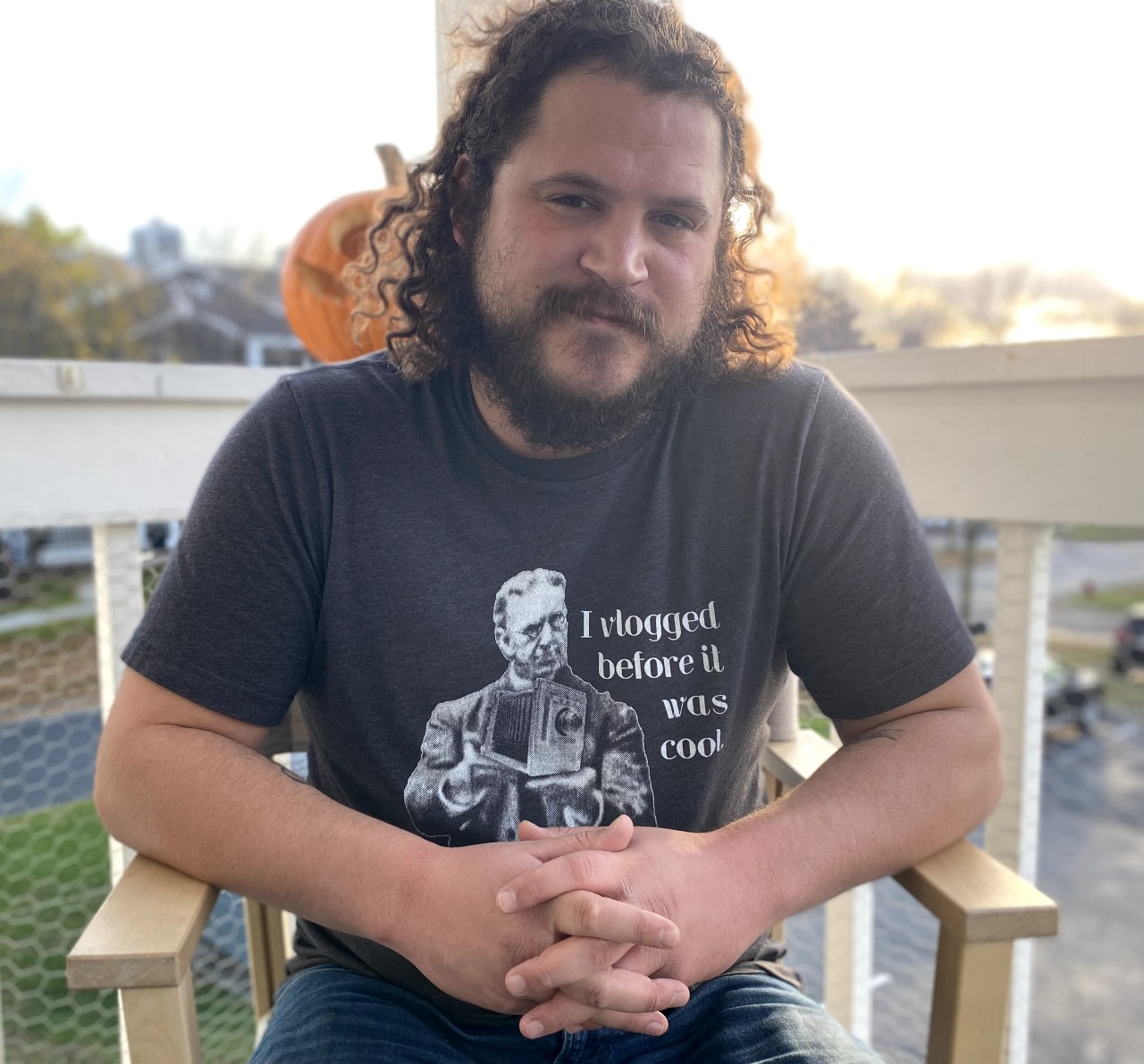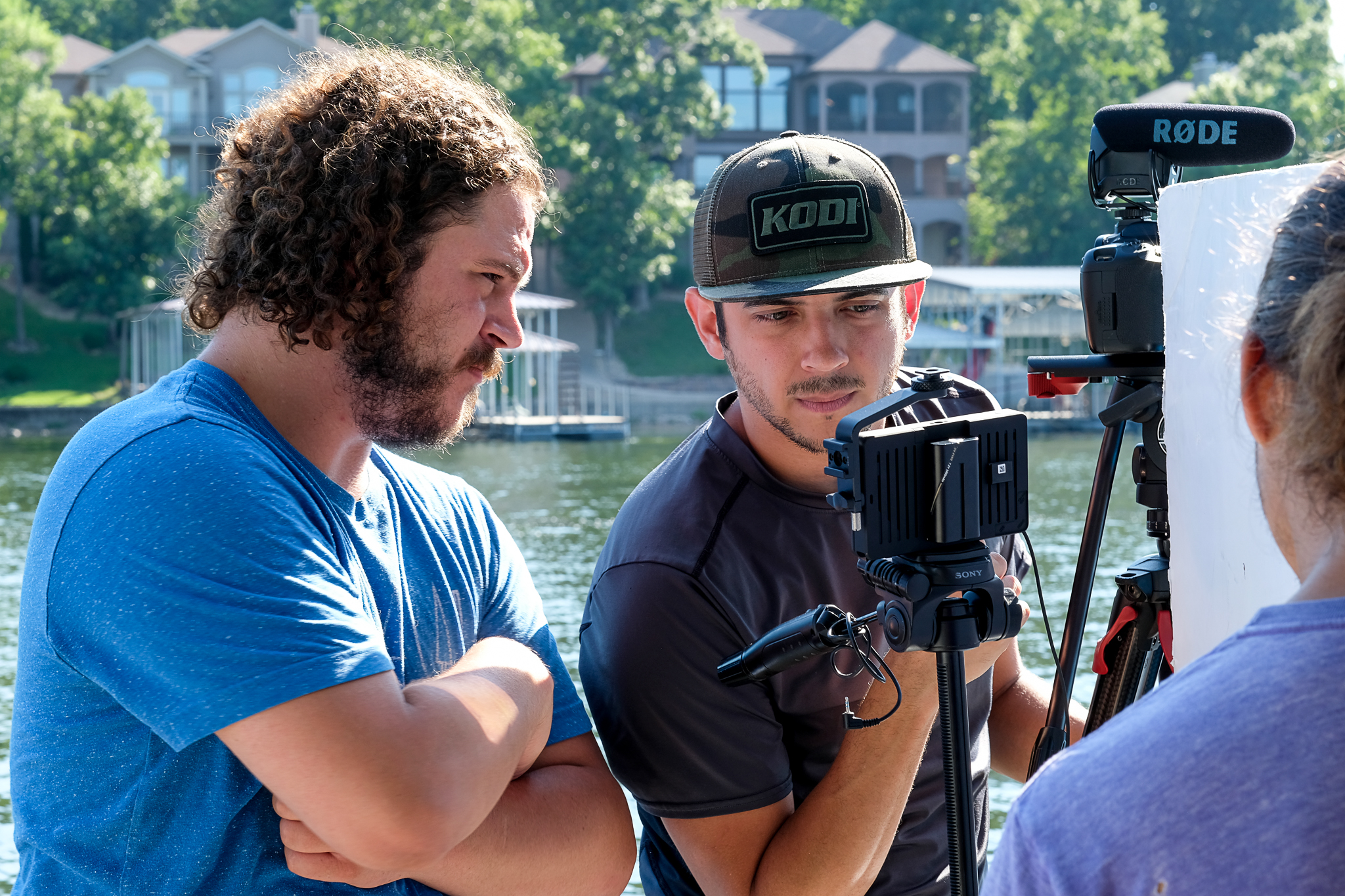Charlie Ainsworth was born and raised in St. Paul, Minnesota, but now calls Eagan, Minnesota home. He was born completely Deaf, as is his brother. When Charlie was born, his family didn’t know that their older child was Deaf. They got both boys tested, and found out both of them were Deaf. “They didn’t have newborn hearing screenings back then. My mom was a huge advocate in getting that all set up in our area.” When his daughter was born, she was screened and it was revealed that she had a hearing loss as well. “So it’s obviously genetic.”
Charlie started his education in the Deaf and Hard of Hearing program at Como Elementary and then to Highland Park for middle school. At the end of 11th grade, he felt that he had enough of interpreting access and opted for direct communication. With that, he transferred to the Minnesota State Academy for the Deaf (MSAD) for his senior year of high school. “I’m grateful I transferred - it was at MSAD where I became proud of my Deaf identity. While in the mainstream school system, I was struggling to find myself. There, I was expected to follow the ‘hearing way’ and at MSAD, I was able to break away from that and discover who I was.”
Upon graduating from MSAD, Charlie graduated from Gallaudet University where he double majored in theater and history. After Gallaudet, he found himself moving to Austin, Texas where he taught at the Texas School for the Deaf. He left after a few years of teaching to establish Angry Deaf People and focus on Deaf cinema. During the pandemic, he entered graduate school and earned a MFA in screenwriting, and now he finds himself back in Minnesota.
Nowadays he is a stay-at-home parent taking care of his daughter. Instead of holding a full-time job Charlie has projects and contracted gigs. “I have some open projects ongoing for Angry Deaf People, and while some of them are not paid, I also do contract work with several agencies, doing translations for educational shows. From time to time I will get a request to do filming on location, such as MSAD or Thompson Hall [Deaf Club].”
Charlie is an avid cinephile, being fascinated by films his entire life. He is fortunate to be able to work in an area that he loves, though he wishes to see better representation in the film industry. “It’s frustrating for me, to see low visibility of Deaf folks in films - where are they? Oppression is real - Hollywood is not ready for the likes of us Deaf folks. They keep showing hearing actors - but where are the Deaf actors?” That limited visibility inspires Charlie to work towards making more opportunities for Deaf actors and filmmakers. “That’s why my company - Angry Deaf People - it’s a group of us, not just myself. Our goal is to elevate Deaf cinema. I want to focus on showcasing the Deaf experience as a genre - our lives, our experiences, our authentic voices, all of it.”
“The film industry - it hasn’t been able to open the gates so it’s up to us Deaf to put our foot in the gate and open it for them.” He goes on to explain how the industry needs to bring on Deaf filmmakers, Deaf screenwriters, etc to present that authentic Deaf experience in film. “There are parts of the Deaf experience that people do not understand - they tend to focus on the ear, such as music - and don’t think about how to film or write from the Deaf perspective.” He shares that he has to be careful how to word things to meet the expectations of the hearing expectations. “So it has been a challenge to find that middle ground, make money from what I do - more times than not, I experience discrimination such as the time during graduate school when we did table readings of our screenplays - my peers would ask me to join in reading lines. I would sign and the interpreter would voice, but they thought the interpreter would do all the work instead of me.” So it was an ongoing cycle of resolving issue after issue during his graduate study. “Educate, educate, it’s an ongoing process.”
“On the other hand, the film industry is competitive - very hard to get in. Nowadays with independent filmmaking, it’s hard to get one’s footing in, and with all the technology and opportunities, it is still very hard for independent filmmakers like me to find success, let alone money among the Hollywood major markets.” Charlie continues to teach himself by learning new technology, reading books on business and marketing films, and working through the challenges with his partners.
“One thing I do want to point out - not all filmmaking has to do with Hollywood films. There are different aspects of filmmaking, and many parts to each part. There are independent films, short films, educational films, documentaries - etc. I look for those opportunities instead of trying to jump high for the Hollywood level ones. It’s not about the fame, it’s more about the art of making films that counts.
Charlie shares that one thing that Deaf people lack is mentorship. “It’s hard for a young person to find a mentor in the field they seek - whether it be filmmaking, acting, directing - etc. That is one thing that I wish I had - a mentor to teach me the ropes and guide me through the experience. I’ve asked other Deaf filmmakers that were older, more experienced, or hearing ones, to help me hone the skills I need to succeed.”
He shares the following advice with young people: “Do not be afraid to seek out mentorship to show you how the system works, how to understand how to navigate that system - it will all help you in the long run. So don’t be afraid to seek mentorship in your chosen field.” He also encourages young people to “Never stop trying.” He shares that he has been working on it for five years, adding skills and education to his work experience despite how slow the process takes. “At some point, things will start looking up and positive outcomes will come, just keep at it and do not give up.” He takes on projects and gigs, does the work, and gets reviews and feedback and keeps going on. “I’ve learned that it’s not the ideas that get you into the industry - it’s about who you know. People connect with you and you connect with others and work on growing that network.” He emphasizes getting the work out and showing what you have done, and how well you did the work, and keep putting the work out there for recognition. “At some point they will start noticing and recognizing you and your work. You will still get rejected many, many times, but keep at it.” The last piece of advice Charlie shares it to “Be your own advocate. Know your skills. Know your limits. Know your rights. Find resources and people to help you along the way.”
When asked about his hobbies, Charlie mentions that he doesn’t have time for hobbies, instead focusing on his family, especially spending time with his daughter. “I work a split schedule, sharing child rearing duties with my wife - I’d parent our daughter while she worked, and vice versa.” He does enjoy playing video games, and used to snowboard quite a bit back in the days but not so much nowadays. He also enjoys reading on deaf studies, deaf history, deaf literature. “I’m always on the hunt for old books that people might not be familiar with - these books fascinate me and I’m always learning about what it means to be Deaf and what it entails.”
In parting, Charlie shares that he and his company, Angry Deaf People, are always on the lookout for folks to expand their lists of folks to work with on film projects. “We want people to join - we can always use the help, in whatever form they come in.” He lists the needs - actors, filmmakers, and set builders. “Every part of filmmaking - we’re always seeking folks to join.” Those who are interested, can contact Charlie at the information below. “Please reach out, and we can make it happen. In the world of filmmaking, we have plenty of Deaf actors - what we need more are the behind the scenes folks - film editors, screenwriters, light designers, set builders, customers, etc. It’s hard to find a crew, let alone a Deaf one. So my goal is to expand the number of skilled Deaf crew by providing opportunities for them to hone their craft by side by side mentorship alongside those experienced in their fields.” The goal is to build bridges by connecting Deaf with mentors in their chosen fields and expand that network of skilled Deaf folks in the film industry. “Hiring Deaf talent - I want to see that happen on a local level and on the bigger level - ie Hollywood. We can work together to make that happen.”
For more information about Charlie's company, visit Angry Deaf People.
The #CanDoAnything campaign showcases people who are deaf, deafblind, or hard of hearing at work, giving them an opportunity to share what they do at their jobs and explain how communication access works for them. This campaign shows what our community can do, which is anything!

